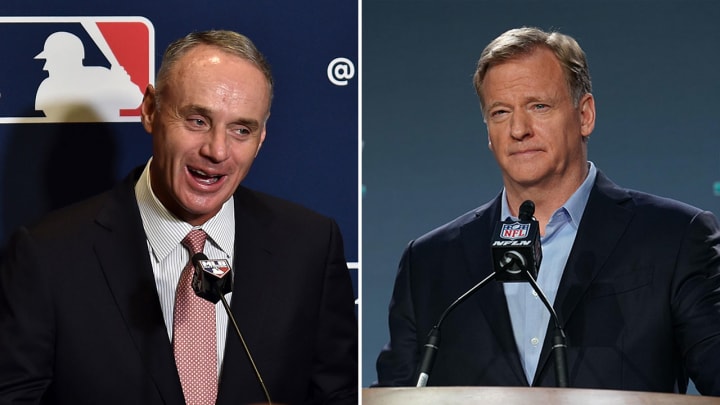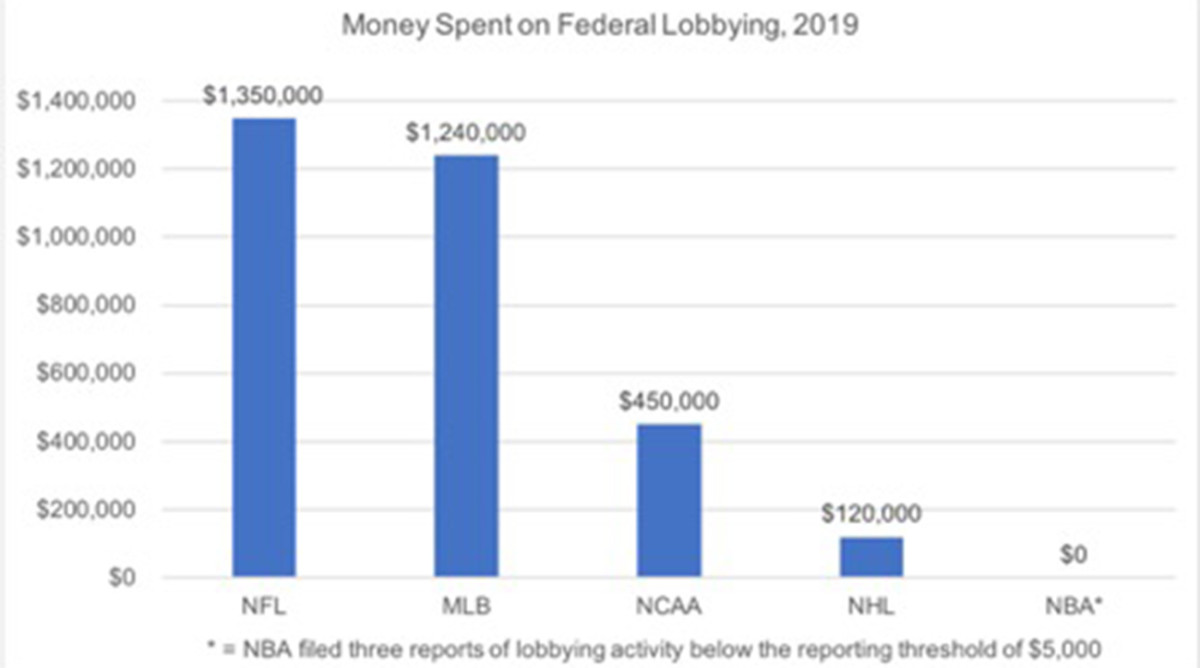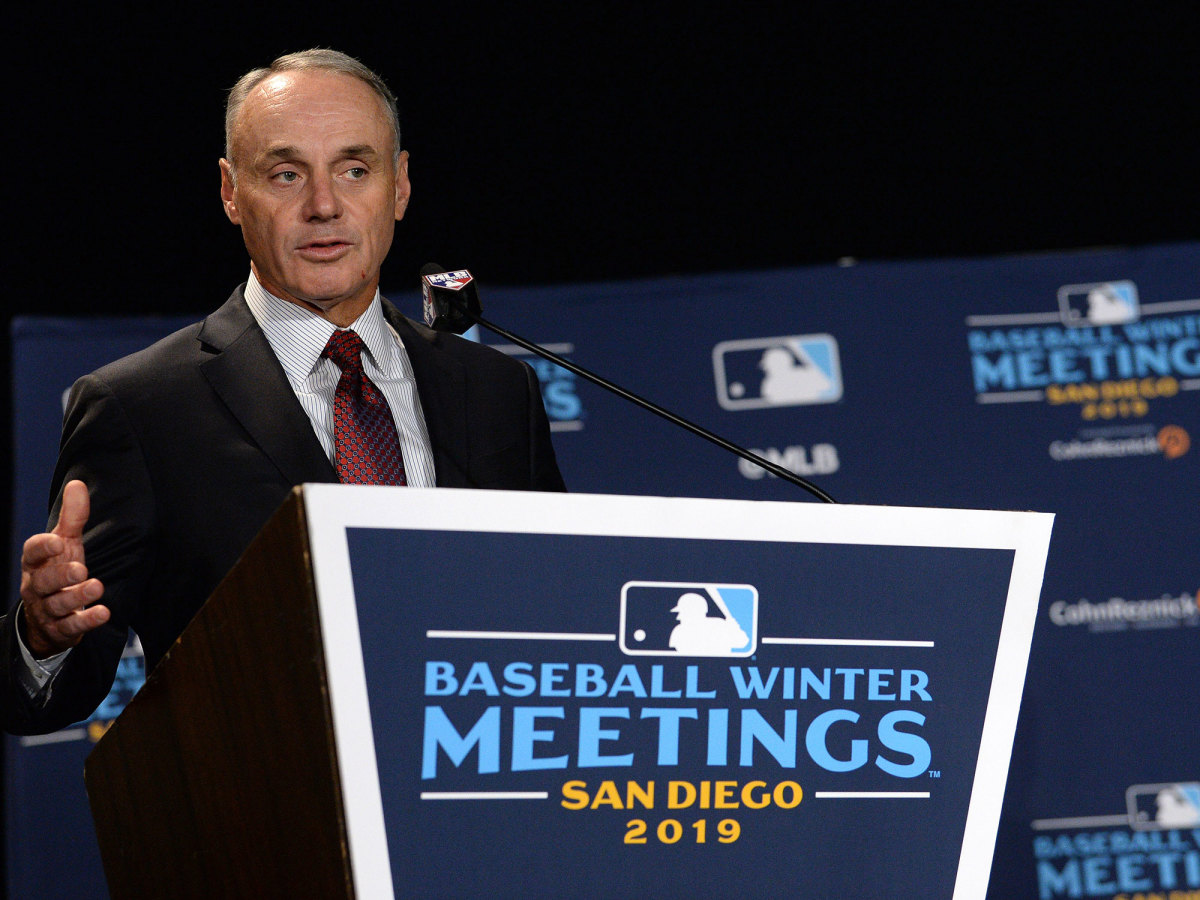What Did Your Favorite League Spend on Federal Lobbying in 2019?

The end of January held its usual milestones for the sports calendar—the leadup to the Super Bowl, mid-season for the NBA and NHL, the cool-down of MLB's hot stove. And, of course, the release of fourth-quarter reports on federal lobbying activity for the prior year.
If that seems irrelevant, it’s not. The NFL, MLB, NHL and NBA are multibillion-dollar businesses. The NCAA is an enormous nonprofit. Government relations are a common point of emphasis for any organization of that caliber; sports associations are no different.
There is a huge variety of issues that leagues have an interest in lobbying for or against, and a similarly huge variety of government groups and agencies that will listen to them. Spending on lobbying doesn’t mean that an organization is guaranteed to get what it wants. But it does mean that it will have a seat at the table to declare its interests on a particular issue. Each of the organizations found itself named on lobbying disclosure reports in 2019:

“Virtually all large corporations and large organizations in the United States do at least some level of lobbying,” says Beth Leech, a professor of political science at Rutgers University who researches lobbying. “If you look at Major League Baseball and the NFL, they’re spending more than a million dollars a year, and that’s on the high-ish end, but it’s by no means near the top.”
This lobbying can involve Congress, the White House or any of various federal agencies; it can be linked to specific legislation or broad issues. (There’s another level of lobbying at statehouses, where issues that can be written into law state by state, such as gambling.) For some leagues, this is a serious business unto itself: MLB and the NFL, along with the NCAA, have dedicated government relations offices of their own in D.C.
"That means that day in and day out," Leech says, "they’re working on this, and they find it in their best interests to have people who are part of the organization doing the lobbying for them, rather than just contracting to an outside firm."
It’s impossible to know just what is being lobbied on. The disclosure forms require organizations to name which individuals lobbied for them, to put their lobbying activity into broad categories—taxes, or immigration, or trade, and so on—and to describe it briefly. But that often doesn’t provide much clarity. “You don’t have to say which side of the issue you lobbied on,” explains Leech. “And if an organization is only interested in a small part of a particular bill, they don’t have to specify which part of that bill it is. They can just refer to the overall bill, which makes it really almost impossible for the outside observer to know from the form itself what it was that the organization was lobbying for.”
But those forms do tell us something. So here’s the breakdown of how much money each league dedicated to federal lobbying in 2019, where it went and what it focused on:
NFL: $1,350,000
What issues did it work on? The NFL lobbied more broadly than any other league, with activity in 12 areas: taxation and internal revenue code; sports and athletics; government issues; aviation, aircraft and airlines; health issues; homeland security; media (information and publishing); trade (domestic and foreign); gaming, gambling and casinos; law enforcement, crime and criminal justice; communications, broadcasting, radio and television; and labor, antitrust and workplace issues.
Which organizations did it lobby besides the House and the Senate? The Departments of Commerce, Homeland Security, Justice, Transportation and the Treasury; the Federal Aviation Administration; the Office of the U.S. Trade Representative; and the White House.
How much did it spend on contracts with external lobbying firms? The NFL was the first of the four major professional leagues to have a government affairs office in D.C., but it still spends heavily on outside lobbyists. Last year, $1.21 million of the NFL’s expenses were dedicated to external firms.

What else to know: The NFL was the only league to lobby on labor issues, and it saved most of that work in-house, rather than turn to an external firm. The NFL’s government affairs office reported lobbying every quarter for what it described as “labor issues generally, including player safety, employee conduct, and antitrust issues.” (It also contracted an outside firm for work on “labor contract issues.”) The topic of player safety came up again under the health category: “issues related to domestic violence, player health and safety.” (A league representative described this work not as lobbying but as an ”education campaign” to inform legislators about the NFL’s work in these areas.)
For its “sports and athletics” lobbying, the NFL lists… just about everything. “Issues relating to stadium security; franchise issues; future NFL events; community relations; federal prohibition on sports betting,” reads one report of league activity from that category. “Legislative and regulatory policy issues affecting the professional sports industry, such as player health and safety, antitrust, intellectual property, and sports betting,” reads another.
As for the rest? There’s work on broadcast policy; unmanned aircraft systems (see: drones that could fly over stadiums, which is why they went to the Department of Homeland Security and FAA); Canadian television programming rules under NAFTA; sports gambling; and “opportunities to move criminal justice reform forward.” (This last one is linked to the social justice committee that the NFL formed in 2018.)
MLB: $1,240,000
What issues did it work on? Foreign relations; taxation and internal revenue code; homeland security; sports and athletics; consumer issues, safety and protection; aviation, aircraft and airlines; government issues; trade (domestic and foreign); and gaming, gambling and casinos.
Which organizations did it lobby besides the House and the Senate? The Departments of Homeland Security, Justice and the Treasury; the Federal Aviation Administration; the Office of Management and Budget; and the White House.
How much did they spend on contracts with external lobbying firms? $780,000. The amount that MLB spends on lobbying has increased markedly since it opened its government relations office in D.C. in 2016, but the majority of the league’s lobbying money is still dedicated to outside firms. And while the majority of the names on these disclosure forms are not familiar to the general public, there’s one here that may ring a bell: Pam Bondi, the former Attorney General of Florida who is now part of Donald Trump’s defense team for his impeachment trial. MLB contracted with Ballard Partners—the firm where Bondi was employed after leaving office in Florida but before working for Trump—to work on “issues related to combatting human trafficking.” Bondi lobbied on MLB’s behalf on that subject with the Senate, House of Representatives and White House in the second and third quarters of 2019. (A fourth-quarter report on MLB noted that Bondi was “no longer expected to act as a lobbyist for the client”; she had been hired by the Trump administration in November. MLB’s government relations office declined to comment on the record.)

What else to know: MLB’s October proposal to contract dozens of minor-league teams—which was met by backlash from some members of Congress, including Sen. Bernie Sanders—was followed by a lobbying effort: The fourth-quarter reports mention lobbying on “issues related to Minor League modernization.”
MLB also stands out as the only one of these organizations to have lobbied on foreign relations: “issues related to Cuba.” (This came up again under its work on trade: “Cuba-related issues” was the line there; MLB had a deal with the Cuban Baseball Federation that would have allowed players to come to the U.S. that was canceled by the Trump administration last April.) Otherwise? Lobbying on tax reform, second-hand ticket sales, gambling and unmanned aircraft.
NCAA: $450,000
What issues did it work on? Sports and athletics; gaming, gambling and casinos; aviation, aircraft and airlines; and immigration.
Which organizations did it lobby besides the House and the Senate? The Executive Office of the White House.
How much did it spend on contracts with external lobbying firms? The NCAA’s split was close to even between in-house work and hired firms: $240,000 to an external group, $210,000 on all other expenses.
What else to know: The NCAA lobbied on the Student-Athlete Equity Act—a bill that was introduced in March that would end the NCAA’s ability to restrict student-athletes’ profit from their name, image and likeness. (The bill has not advanced.) Its lobbying on the bill was in the same category as “issues related to athletic scholarships, health and safety, academic success, the collegiate athletic model, and amateurism.” The NCAA’s government affairs office did not respond to a request for comment.
The NCAA’s immigration lobbying was related to the DREAM Act of 2019, which would create a pathway to granting residency status for young undocumented immigrants. The “aviation, aircraft, and airlines” was—like the NFL and MLB—on drones, and the “gambling” was on “the health and well-being of student-athletes and protecting the integrity of athletic competitions.”
NHL: $120,000
What issues did it work on? Health issues; taxation and internal revenue code; and sports and athletics.
Which organizations did it lobby besides the House and Senate? The U.S. Copyright Office.
How much did it spend on contracts with external lobbying firms? $120,000. The NHL does not do any lobbying through a government affairs office of its own.

What else to know: The NHL lobbied for the Willie O’Ree Congressional Gold Medal Act, which would give the country’s highest civilian honor to Willie O’Ree, who became the first black player in the NHL when he integrated the league in 1958. (The bill was introduced in June but has not moved forward. The NHL screened a documentary about his life for members of Congress in November and has continued to support the act.)
The NHL’s other activity was relatively limited—work on cable royalty payments and on the Personal Health Investment Today Act, a bill that would allow people to use health savings accounts to pay for sports and fitness activities.
NBA: $0 (Kind Of)
What issues did it work on? Sports and athletics.
Which organizations did it lobby? The U.S. Copyright Office. (And just the U.S. Copyright Office—no House or Senate.)
How much did it spend on contracts with external lobbying firms? It’s hard to know precisely. While disclosure forms must be filed for any lobbying activity, the amount of money must be disclosed only if it exceeds $5,000. The NBA was named on three separate reports—all from the same firm, all with work on “cable and satellite royalty payments” to the U.S. Copyright Office—but none of those reports was for more than $5,000. These could have represented $1 each or $4,999 each. Either way, however: The NBA spent far less on federal lobbying than any of its counterparts.
What else to know: The NBA’s relative lack of federal lobbying is actually fairly new. While it never spent as much as MLB or the NFL, it spent as much as $370,000 as recently as 2007, and was consistently spending at least $100,000 until 2014. What changed? Adam Silver’s first full year as commissioner was 2015. The NBA did not respond to a request for comment.
